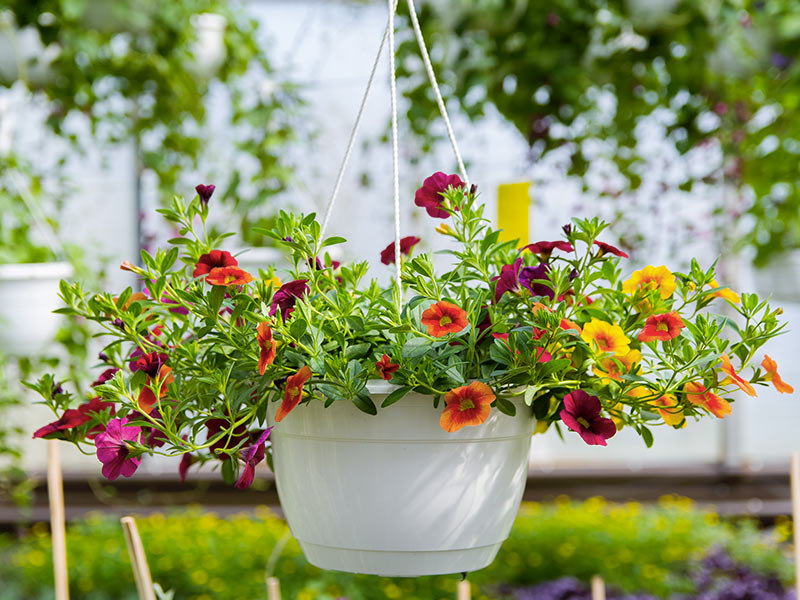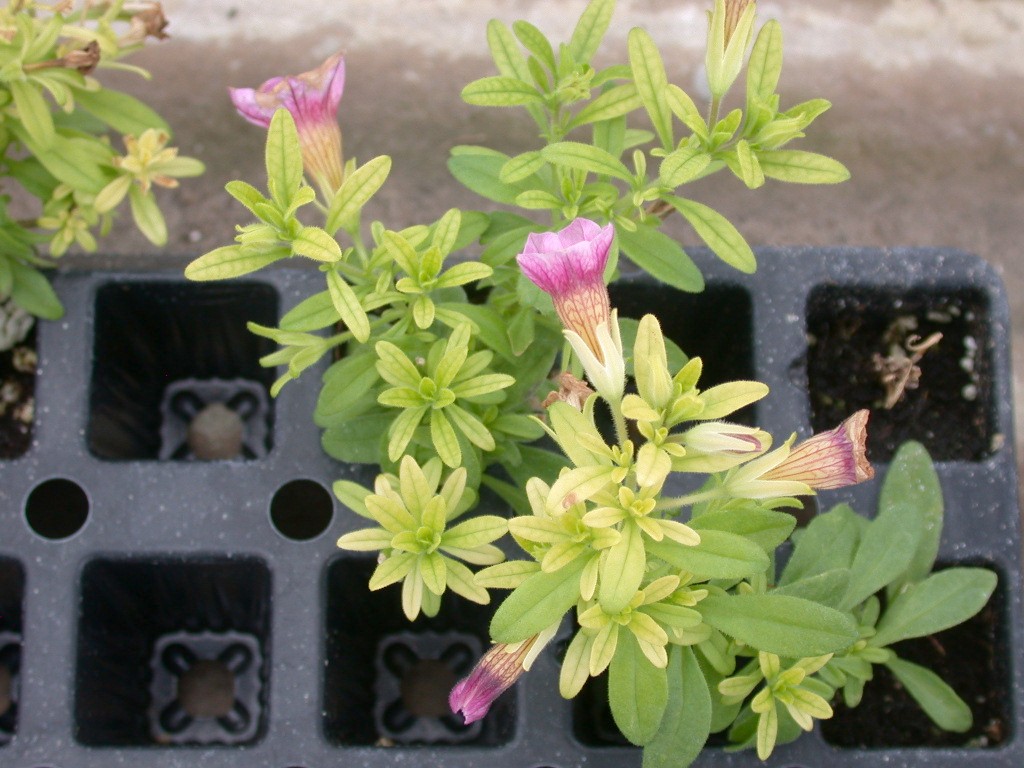Training Center
Growing Tough Crops: Calibrachoa
Thursday, September 7, 2023 | Ed Bloodnick

Calibrachoa (also known as ‘Million Bells’) is a stunning plant when in full bloom from May through frost. It has become a very popular crop because of its performance for the end user.
However, it has production challenges that have given growers headaches. The two most common problems with Calibrachoa plants are chlorosis of new growth and root disease.
1. Interveinal Chlorosis of Calibrachoa New Growth
Most growers have seen calibrachoa plants displaying symptoms of interveinal chlorosis of the new leaves. This is quite common and is typically caused by iron deficiency induced from a high pH in the growing medium. The ideal growing medium on the pH scale for calibrachoa is 5.4-5.8. If the pH exceeds 6.2, then the iron becomes unavailable to the plant.
However, we have seen other problems in which the pH of the growing is ideal, but iron deficiency is occurring because of insufficient application of iron. Most fertilizers simply do not provide enough iron for calibrachoa unless they are constant feed at 250 ppm nitrogen, or the fertilizer is formulated with extra iron.
Unfortunately, constant feeding calibrachoa at high rates just to get enough iron produces soft, stretched growth. It may be better to reduce the constant fertilizer application rate to 150-200 ppm nitrogen and apply an iron chelate once per month. It will compensate for reduced iron levels. Another option is to use a complete fertilizer that provides elevated iron levels and better iron chelates.

Calibrachoa exhibiting iron deficiency symptoms. Source: Premier Tech.
How to Fix Iron Defiency?
If calibrachoa plants are exhibiting iron deficiency, the fastest way to correct the problem is applying an iron chelate. The most effective chelate is Iron-EDDHA. It allows iron to remain soluble and available for plant uptake even if the pH of the growing medium exceeds 9.0. Iron-DTPA is an effective chelate, while iron-EDTA is ineffective if the growing medium pH exceeds 6.5.
New Leaf Interveinal Chlorosis = Iron Deficiency?
In most cases, this is true, but start by checking the plant roots. When root tips are attacked by plant pathogens, they cannot take up fertilizer elements from the growing medium, causing nutrient deficiencies. Iron deficiency caused by root diseases is often random through the crop. If the symptoms are expressed uniformly throughout a single cultivar or the entire crop, then it most likely is not caused by root disease.
Interveinal chlorosis can also be a symptom of manganese deficiency. To verify if this is the issue, apply an iron chelate. If the plant temporarily shows some improvement in foliar color but then after a few days shows more severe chlorosis, manganese deficiency is likely the problem.
Before assuming that an iron deficiency is occurring, test the growing medium and plant tissue to confirm the problem prior to adding iron chelates.
2. Type of Calibrachoa’s Root Diseases
Calibrachoa plants are sensitive to root diseases caused by Pythium and Thielaviopsis, or black root rot. Both pathogens need high moisture conditions to survive. Plants that are likely to be attacked are those that are staying too wet or are overwatered.
We recommend - using a growing medium such as PRO-MIX HP BIOFUNGICIDE* + MYCORRHIZAE which has lower water retention, good drainage and the added benefit of BIOFUNGICIDE™* to help suppress root disease. Remember to allow the growing medium surface to turn light brown to tan as an indicator of when to water.
*BIOFUNGICIDE is only available in the United States. All BIOFUNGICIDE products are available under BIOSTIMULANT in Canada and Latin America. For more information, ask your Sales Representative.

Calibrachoa with Pythium root rot disease. Source: Premier Tech.
How to Prevent Root Disease of Calibrachoa?
Calibrachoa are susceptible to these pathogens at any stage but are particularly vulnerable when they are young. To reduce this threat, it is best to keep the growing medium temperatures above 68°F (20°C) until the crop is well rooted.
After the roots have taken, calibrachoa can be grown in a cooler environment. At that point, they have an established root system that can use the water from the growing medium, reducing incidence of root disease.
Try to encourage good airflow to aid in the dry-down of the growing medium and maintain normal fertility levels to keep the plants actively growing. Avoid reusing containers unless they have been cleaned of debris and properly sanitized.
Cultivar selection is also important. Those with compact growth habits grow slower and thereby use less water. They are easy to overwater compared to vigorous cultivars. It is best to separate compact from vigorous plants to properly adapt to their watering requirements.
Problems can occur with any crop at any time. Be proactive and adjust cultivation practices to minimize problems with calibrachoa (‘Million Bells’) and other crops.
If you have questions and would like to talk with someone about fertility, water quality or growing medium needs, contact your Premier Tech Grower Services Representative:
 |
 |
 |
 |
|---|---|---|---|
|
Ed Bloodnick |
Nathan Wallace-Springer |
Lance Lawson |
Victor Brantly |
 |
 |
 |
|
|
Troy Buechel |
Susan Parent |
Jose Chen Lopez |
PRO-MIX® is a registered trademark of PREMIER HORTICULTURE Ltd.

 Where to find our products
Where to find our products
